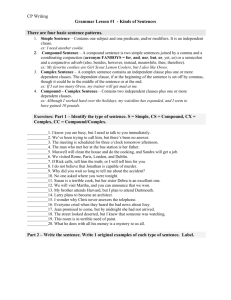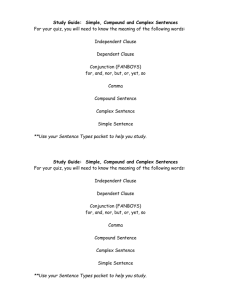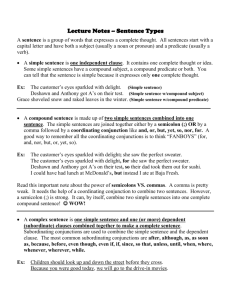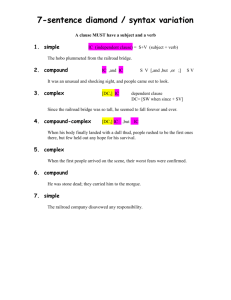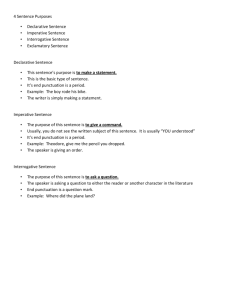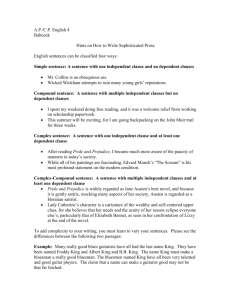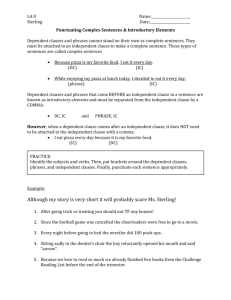Sentence Structure
advertisement
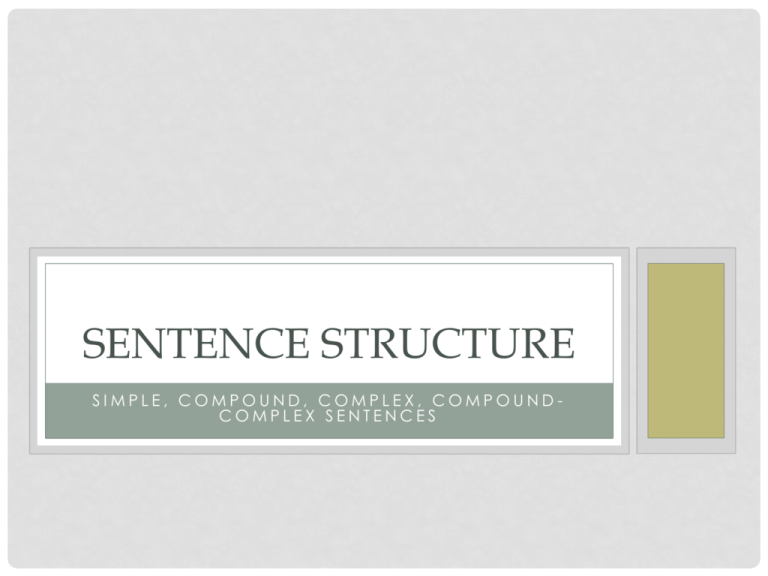
SENTENCE STRUCTURE SIMPLE, COMPOUND, COMPLEX, COMPOUNDCOMPLEX SENTENCES WHAT IS SENTENCE STRUCTURE? • The structure of a sentence refers to the kinds and the number of clauses it contains. • The four kinds of sentences are simple, compound, complex, and compound-complex. SIMPLE SENTENCES • A simple sentence contains one independent clause and no subordinating clauses. S V • EX: The hairstylist gave Laura a new look. S V • EX: Ernesto has volunteered to organize the recycling campaign. SIMPLE SENTENCES CONT. • A simple sentence may contain a compound subject, a compound verb, and any number of phrases. S S V • EX: Beth Heiden and Sheila Young won Olympic medals. [compound subject] S V V • EX: Lawrence caught the ball but then dropped it. [compound verb] S S V • EX: The astronomer and her assistant studied the meteor and V wrote reports. [compound subject and compound verb] IDENTIFY THE SUBJECTS AND THE VERBS IN THE FOLLOWING SIMPLE SENTENCES 1. As protection from such weapons, warriors in battle needed special equipment. 2. Some warriors used shields of wood or animal hides. 3. By 1800 B.C., the Greeks had made the first metal armor out of bronze. 4. Later, the Romans manufactured strong iron armor and designed special equipment, such as shinguards. 5. Before and during the Middle Ages, European knights and foot soldiers often dressed in skirts of chain mail. IDENTIFY THE SUBJECTS AND THE VERBS IN THE FOLLOWING SIMPLE SENTENCES 1. As protection from such weapons, warriors in battle needed special equipment. 2. Some warriors used shields of wood or animal hides. 3. By 1800 B.C., the Greeks had made the first metal armor out of bronze. 4. Later, the Romans manufactured strong iron armor and designed special equipment, such as shinguards. 5. Before and during the Middle Ages, European knights and foot soldiers often dressed in skirts of chain mail. COMPOUND SENTENCES • A compound sentence contains two or more independent clauses and no subordinate clauses. • The independent clauses are usually joined by a comma and a coordinating conjunction. S V F for A and N nor B but O or • EX: The whistle blew, the drums rolled, and the Y yet crowd cheered. [three independent clauses, S so • EX: According to legend, Betsy Ross made our S V first flag, but little evidence supports this claim. [two independent clauses joined by the conjunction but.] S S V S V V the last two joined by the conjunction and.] SIMPLE VS. COMPOUND • Do not confuse a compound sentence with a simple sentence that contains a compound subject, a compound verb, or both. S S V • SIMPLE SENTENCE: Alberto and Jared increased their speed V and passed the other runners. [compound subject and compound verb] S V • COMPOUND SENTENCE: Alberto led for half the distance, S V and then Jared took the lead. [two independent clauses] COMPOUND SENTENCES CONT. • The independent clauses in a compound sentence may also be joined by a semicolon, a conjunctive adverb, and a comma. S V • EX: Many mathematical concepts originated in North S V Africa; the ancient Egyptians used these concepts in building the pyramids. S V S V • Lynn called Marty with the good news; however, he was not at home. IDENTIFYING SUBJECTS, VERBS, AND CONJUNCTIONS IN COMPOUND SENTENCES 1. Many strange things happen backstage during a performance, but the audience usually does not know about them 2. The director of a theater visited our class, and we listened to his stories for almost an hour. 3. According to him, the workers in charge of properties are usually alert and careful; however, they still make mistakes sometimes. 4. Directors cannot always predict the reactions of the audience, nor can they always control the audience. IDENTIFYING SUBJECTS, VERBS, AND CONJUNCTIONS IN COMPOUND SENTENCES 1. Many strange things happen backstage during a performance[, but] the audience usually does not know about them. 2. The director of a theater visited our class[, and] we listened to his stories for almost an hour. 3. According to him, the workers in charge of properties are usually alert and careful[; however,] they still make mistakes sometimes. 4. Directors cannot always predict the reactions of the audience[, nor] can they always control the audience. COMPLEX SENTENCES • A complex sentence contains one independent clause and at least one subordinate clause. S V S V • EX: When I watch Martha Graham’s performances, I feel like studying dance. • INDEPENDENT CLAUSE: I feel like studying dance • SUBORDINATE CLAUSE: When I watch Martha Graham’s performances S V • EX: In Gone with the Wind, when Scarlett is faced with nearS V S V starvation, she vows that she never will be hungry again. • INDEPENDENT CLAUSE: In Gone with the Wind, she vows • SUBORDINATE CLAUSE: when Scarlett is faced with near-starvation • SUBORDINATE CLAUSE: that she never will be hungry again COMPLEX SENTENCES CONT. • Independent clauses can be interrupted by subordinate clauses. S S V V • EX: All of the stars that we can see without a telescope are part of the Milky Way galaxy. • INDEPENDENT CLAUSE: All of the stars are part of the Milky Way Galaxy • SUBORDINATE CLAUSE: that we can see without a telescope • Notice in the examples above that a subordinate clause can appear at the beginning, in the middle, or at the end of a complex sentence. IDENTIFYING INDEPENDENT CLAUSES AND SUBORDINATE CLAUSES IN COMPLEX SENTENCES 1. China, which has a population of more than one billion people, is a largely agricultural country. 2. Although it was nearly worthless, my brother bought one of those old coins for his collection. 3. The detective show appeared on television for several weeks before it became popular with viewers. 4. A group of popular singers, who donated their time, recorded a song that made people aware of a famine in Ethiopia. 5. While the stage crew was constructing the sets, the performers continued their rehearsal, which went on into the night. IDENTIFYING INDEPENDENT CLAUSES AND SUBORDINATE CLAUSES IN COMPLEX SENTENCES 1. China, which has a population of more than one billion people, is a largely agricultural country. 2. Although it was nearly worthless, my brother bought one of those old coins for his collection. 3. The detective show appeared on television for several weeks before it became popular with viewers. 4. A group of popular singers, who donated their time, recorded a song that made people aware of a famine in Ethiopia. 5. While the stage crew was constructing the sets, the performers continued their rehearsal, which went on into the night. COMPOUND-COMPLEX SENTENCES • A compound-complex sentence contains two or more independent clauses and at least one subordinate clause. S V • EX: Mary began painting only two years ago, but already S V she has been asked to show one of her paintings at the S V exhibit that is scheduled for May. • INDEPENDENT CLAUSE: Mary began painting only two years ago • INDEPENDENT CLAUSE: already she has been asked to show one of her paintings at the exhibit • SUBORDINATE CLAUSE: that is scheduled for May COMPOUND-COMPLEX CONT. S V S V S V • EX: When Bill left, he locked the door, but he forgot to turn off the lights. • INDEPENDENT CLAUSE: he locked the door • INDEPNDENT CLAUSE: he forgot to turn off the lights • SUBORDINATE CLAUSE: When Bill left COMPOUND-COMPLEX CONT. S V S V • EX: Emilia has several hobbies that she enjoys, but S S V V the one on which she spends the most time is woodcarving. • • • • INDEPENDENT CLAUSE: Emilia has several hobbies INDEPENDENT CLAUSE: the one is woodcarving SUBORDINATE CLAUSE: that she enjoys SUBORDINATE CLAUSE: on which she spends the most time IDENTIFY CLAUSES IN COMPOUNDCOMPLEX SENTENCES 1. When they returned from their vacation, they collected their mail at the post office, and they went to the supermarket 2. We told them that their plan wouldn’t work, but they wouldn’t listen to us. 3. The smoke, which steadily grew thicker and darker, billowed through the dry forest; the animals ran ahead of the fire as it spread quickly. 4. Our new neighbors, who moved in last month, have painted their house, and the children have put up a basketball hoop. IDENTIFY CLAUSES IN COMPOUNDCOMPLEX SENTENCES 1. When they returned from their vacation, they collected their mail at the post office, and they went to the supermarket. 2. We told them that their plan wouldn’t work, but they wouldn’t listen to us. 3. The smoke, which steadily grew thicker and darker, billowed through the dry forest; the animals ran ahead of the fire as it spread quickly. 4. Our new neighbors, who moved in last month, have painted their house, and the children have put up a basketball hoop. INDEPENDENT PRACTICE • Complete Review A, (#1-10) Identifying the Four Kinds of Sentence Structure, on page 469 of the Holt Literature book. • Complete Chapter 16 Review A, (#1-30) Identifying Sentence Structures, on page 471. • Use your notes for reference!
